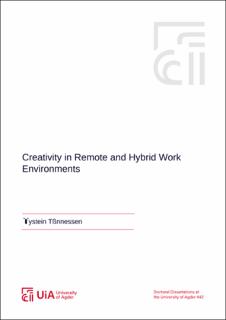| dc.contributor.author | Tønnessen, Øystein | |
| dc.date.accessioned | 2023-11-24T09:16:37Z | |
| dc.date.available | 2023-11-24T09:16:37Z | |
| dc.date.created | 2023-11-10T11:53:08Z | |
| dc.date.issued | 2023 | |
| dc.identifier.citation | Tønnessen, Ø. (2023). Creativity in Remote and Hybrid Work Environments. [Doctoral dissertation]. University of Agder. | en_US |
| dc.identifier.isbn | 978-82-8427-159-0 | |
| dc.identifier.issn | 1504-9272 | |
| dc.identifier.uri | https://hdl.handle.net/11250/3104485 | |
| dc.description.abstract | Workplace creativity is crucial for innovation and navigation in a dynamic technology-driven world. This dissertation sheds light on individual and group creativity within flexible work arrangements (FWA), an expanding yet understudied field. Specifically, the four appended research papers explore creativity in two remote work settings – work from home (WFH) and corporate coworking (working remotely from coworking spaces), as well as within hybrid work combining remote and office work. The overarching research objective is to understand how creativity unfolds in remote and hybrid work environments. The papers include a systematic literature review on corporate coworking and creativity, a quantitative study of creative performance in an enforced WFH setting, a phenomenological study of collective creativity, and a case study investigating creative processes in a hybrid work environment. All the papers are intertwined with the profound shifts in work practices occurring before, during, and after the COVID-19 pandemic. The findings emphasize the importance of social interaction and knowledge sharing for workplace creativity. In remote work settings, challenges due to digital communication barriers and complexities of building social ties and trust are identified. Extensive use of digital platforms during the initial pandemic lockdown was found to promote creative performance. In contrast, information technology (IT) professionals working from home experienced that the absence of informal face-to-face (FTF) interaction hindered creativity. However, well-facilitated digital sessions triggered collective creativity. Analysis of creative processes in a multinational technology company suggested that in-person interaction was favorable for problem identification, whereas idea generation should be conducted either entirely remotely or FTF. Hybrid work in real time was perceived beneficial for idea evaluation only. By combining the two research fields of creativity and FWA, this dissertation expands both literatures. Utilizing social capital theory and social information processing theory deepens our understanding of the social dynamics of creativity in remote and hybrid work. Organizations should design physical and digital work environments that promote informal social interaction, knowledge sharing, and a creative climate. To facilitate creativity, this dissertation recommends hybrid models that balance employee and employer needs, and optimize the benefits of both FTF interaction and remote work. | en_US |
| dc.language.iso | eng | en_US |
| dc.publisher | University of Agder | en_US |
| dc.relation.ispartof | Doctoral dissertations at University of Agder | |
| dc.relation.ispartofseries | Doctoral dissertations at University of Agder;no. 442 | |
| dc.relation.haspart | Paper I: Tønnessen, Ø. (2022). Employee Creativity in Coworking Spaces: Towards a Conceptual Framework. European Journal of Workplace Innovation, 7 (1). https://doi.org/10.46364/ejwi.v7i1.891. Accepted version. Full-text is available in AURA as a separate file: https://hdl.handle.net/11250/3014322 | en_US |
| dc.relation.haspart | Paper II: Tønnessen, Ø., Dhir, A. & Flåten, B.-T. (2021). Digital knowledge sharing and creative performance: Work from home during the COVID-19 pandemic. Technological Forecasting and Social Change, 170. https://doi.org/10.1016/j.techfore.2021.120866. Accepted version. Full-text is available in AURA as a separate file: https://hdl.handle.net/11250/2988839 | en_US |
| dc.relation.haspart | Paper III: Tønnessen, Ø. & Flåten, B.-T. (2023). Work from home and collective creativity: Exploring the experiences of IT professionals. Cogent Business & Management, 10(3). https://doi.org/10.1080/23311975.2023.2262219. Accepted version. Full-text is available in AURA as a separate file: https://hdl.handle.net/11250/3104480 | en_US |
| dc.relation.haspart | Paper IV: Tønnessen, Ø. & Flåten, B.-T. (2023). Creative processes in a hybrid work environment: A case study. The Journal of Creative Behavior. Submitted version. Full-text is not available in AURA as a separate file. | en_US |
| dc.rights | Attribution-NonCommercial-NoDerivatives 4.0 Internasjonal | * |
| dc.rights.uri | http://creativecommons.org/licenses/by-nc-nd/4.0/deed.no | * |
| dc.title | Creativity in Remote and Hybrid Work Environments | en_US |
| dc.type | Doctoral thesis | en_US |
| dc.description.version | publishedVersion | en_US |
| dc.rights.holder | © 2023 Øystein Tønnessen | en_US |
| dc.subject.nsi | VDP::Samfunnsvitenskap: 200::Økonomi: 210 | en_US |
| dc.source.pagenumber | 238 | en_US |
| dc.source.issue | 442 | en_US |
| dc.identifier.cristin | 2195016 | |




